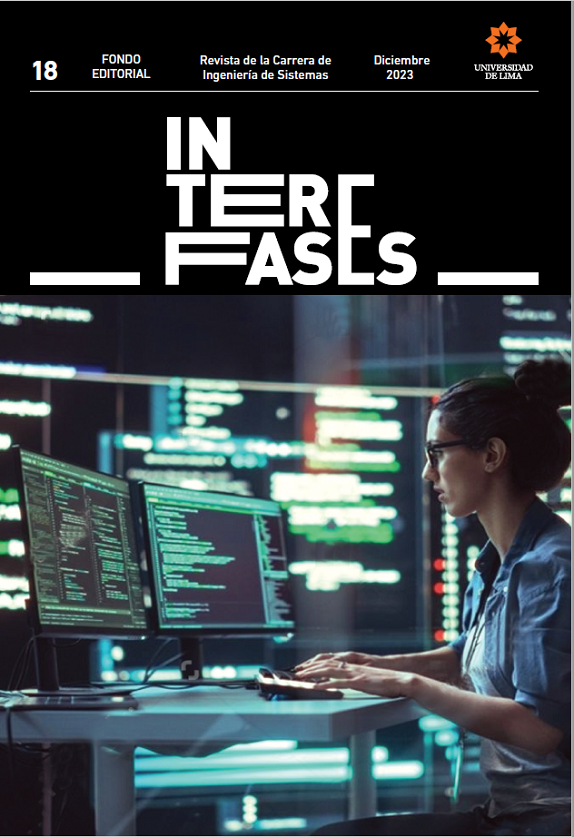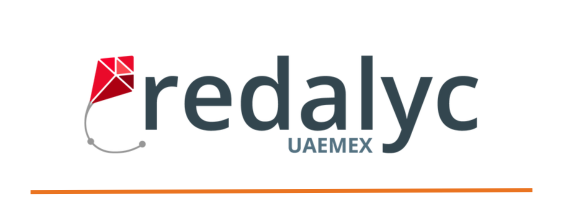Women in STEM: Academic Productions in the Brazilian Context
DOI:
https://doi.org/10.26439/interfases2023.n018.6615Keywords:
women, Brazil, STEM, science & technologyAbstract
The low number of women in the so-called STEM fields has been the subject of research around the world. Such investigations are important for expanding the discussion and reflection on the disparity between the number of men and women in these areas. With this in mind, this article seeks to contribute to an understanding of the Brazilian academic scenario regarding the participation of women in the STEM (world of) work. Thus, the question that guided our mapping was: what is the national production on women’s participation in the Brazilian STEM scene? To this end, we searched the following databases: SCOPUS, Web of Science, Google Scholar and Scielo, and found a total of 47 references. These were analyzed and separated into six groups according to their central proposal.
Downloads
References
Araújo, B. M. de, Sanches, C. A., & Lopes, T. (2001). Mulher e tecnologia. Comunicação e sociedade, 3, 209–218. https://doi.org/10.17231/comsoc.3(2001).1324
Araújo, M. T., & Tonini, A. M. (2020). A participação das mulheres nas áreas de STEM (Science, Technology Engineering and Mathematics). Revista de Ensino de Engenharia, 38(3). http://revista.educacao.ws/revista/index.php/abenge/article/view/1693/905
Bacelar, A. S., Campos, A. C., Santos, L. T., do Nascimento, T. B. P., & de Rezende, D. C. (2021). Gênero e Construcionismo Social: Os Desafios das Mulheres na Tecnologia da Informação. Revista de Administração IMED, 11(1), 1-23.
Benitez-Herrera, S., Spinelli, P. F., Mano, S., & Paula Germano, A. (2019). Pursuing gender equality in Astronomy in basic education: the case of the project “Girls in the Museum of Astronomy and Related Sciences”. EPJ web of conferences, 200, 02010. https://doi.org/10.1051/epjconf/201920002010
Bezak, E., Carson-Chahhoud, K. V., Marcu, L. G., Stoeva, M., Lhotska, L., Barabino, G. A., Ibrahim, F., Kaldoudi, E., Lim, S., Marques da Silva, A. M., Tan, P. H., Tsapaki, V., & Frize, M. (2022). The biggest challenges resulting from the COVID-19 pandemic on gender-related work from home in biomedical fields—world-wide qualitative survey analysis. International Journal of Environmental Research and Public Health, 19(5), 3109. https://doi.org/10.3390/ijerph19053109
Brito, C., Pavani, D., & Lima Jr, P. (2015). Meninas na ciência: atraindo jovens mulheres para carreiras de ciência e tecnologia. Revista Gênero, 16(1).
Carneiro, S. G., Silva, G. C., da Silva, L. A., da Costa, V. G., & da Silva, A. V. (2020). Mulheres nas ciências de exatas, engenharia e computação: uma revisão integrativa. Humanidades e Tecnologia (Finom), 20(1), 159-175.
Cordeiro, A. M., Oliveira, G. M. de, Rentería, J. M., & Guimarães, C. A. (2007). Revisão sistemática: uma revisão narrativa. Revista do Colegio Brasileiro de Cirurgioes, 34(6), 428-431. https://doi.org/10.1590/s0100-69912007000600012
Cristina Battirola, L., de Oliveira Setti, G., Rodriguez Linares, D., Santana de Almeida, B., Pierina Uliana, M., & da Costa Silva Goncalves, C. (2022). Gender parity in science: An analysis of womens’s participation in Argentina, Brazil and Paraguay. Revista Virtual de Química, 14(2), 235-246. https://doi.org/10.21577/1984-6835.20220004
Cunha, M. B. da, Peres, O. M. R., Giordan, M., Bertoldo, R. R., Marques, G. de Q., & Duncke, A. C. (2014). As mulheres na ciência: o interesse das estudantes brasileiras pela carreira científica. Educación química, 25(4), 407-417. https://www.scielo.org.mx/scielo.php?script=sci_arttext&pid=S0187-893X2014000400002
Cunha, U. F. C., Miranda, C. M., & Rambo, M. K. D. (2020). Mulheres nas ciências exatas e tecnologias: um olhar para a Universidade Federal Do Tocantins – UFT na perspectiva de gênero. Humanidades & Inovação, 7(2), 276-289. https://revista.unitins.br/index.php/humanidadeseinovacao/article/view/1754
Dantas, C., Gomes, A. M. G., & Venero, M. L. F. (2017). Programação em Python: Inserindo mulheres na tecnologia. Anais dos Workshops do VI Congresso Brasileiro de Informática na Educação (CBIE 2017).
de Araújo, M. T., & Tonini, A. M. (2020). A participação das mulheres nas áreas de STEM (Science, Technology Engineering and Mathematics). Revista de Ensino de Engenharia, 38(3). http://revista.educacao.ws/revista/index.php/abenge/article/view/1693/905
Dias Canedo, E., Acco Tives, H., Bogo Marioti, M., Fagundes, F., & Siqueira de Cerqueira, J.
A. (2019). Barriers faced by women in software development projects. Information
(Basel), 10(10), 309. https://doi.org/10.3390/info10100309
Ferreira, H. A. R., Barbosa, A. F., Braga, R. B., Viana, M. N., & Oliveira, C. T. (2018). Metodologiade um Projeto de Extensão para Inclusão, Desmistificação e Empoderamento de Jovens Mulheres em Tecnologias da Informação e Comunicação. Anais Do Women in Information Technology (WIT).
Follador, S. R. (2021). {reprograma}: gênero e tecnologia em um estudo de caso preliminar. Estudos feministas, 29(1). https://doi.org/10.1590/1806-9584-2021v29n167314
Frade, R. L. (2021). Comunidades de mulheres em tecnologia: estudo comunicacional e organizacional. Anais do XV Women in Information Technology (WIT 2021).
Freitas, L. B. de, & Luz, N. S. da. (2017). Gênero, Ciência e Tecnologia: estado da arte a partir de periódicos de gênero. Cadernos Pagu, (49). https://doi.org/10.1590/18094449201700490008
Frize, M., Lhotska, L., Marcu, L. G., Stoeva, M., Barabino, G., Ibrahim, F., Lim, S., Kaldoudi,
E., Marques da Silva, A. M., Tan, P. H., Tsapaki, V., & Bezak, E. (2021). The impact of COVID-19 pandemic on gender-related work from home in STEM fields—Report of the WiMPBME Task Group. Gender, Work, and Organization, 28(S2), 378–396. https://doi.org/10.1111/gwao.12690
Gallindo, E. L., Cruz, H. A., & Moreira, M. W. L. (2021). Critical examination using business intelligence on the gender gap in information technology in Brazil. Mathematics, 9(15), 1824. https://doi.org/10.3390/math9151824
Garcia-Holgado, A., Gonzalez-Gonzalez, C. S., & Peixoto, A. (2020). A comparative study on the support in engineering courses: A case study in Brazil and Spain. IEEE access: practical innovations, open solutions, 8, 125179–125190. https://doi.org/10.1109/access.2020.3007711
Guzman, I., Berardi, R., Maciel, C., Cabero Tapia, P., Marin-Raventos, G., Rodriguez, N., & Rodriguez, M. (2020). Gender Gap in IT in Latin America. AMCIS 2020 Proceedings.
Hayashi, M. C. P. I., Cabrero, R. de C., Costa, M. da P. R. da, & Hayashi, C. R. M. (2007). Indicadores da participação feminina em Ciência e Tecnologia. Transinformação, 19(2), 169-187. https://www.scielo.br/j/tinf/a/Ls7NZzhhV6fh3ksyP4LfsBQ/?lang=pt
Heo, S., Chan, A. Y., Diaz Peralta, P., Jin, L., Pereira Nunes, C. R., & Bell, M. L. (2022). Impacts of the COVID-19 pandemic on scientists’ productivity in science, technology, engineering, mathematics (STEM), and medicine fields. Humanities & Social Sciences Communications, 9(1). https://doi.org/10.1057/s41599-022-01466-0
Inoue, C. R. (2015). Tipos de revisão de literatura. Biblioteca Professor Paulo de Carvalho Mattos. Botucatu-SP.
Iwamoto, H. M. (2022). Mulheres nas STEM: um estudo brasileiro no diário oficial da união. Cadernos De Pesquisas, 52. https://doi.org/10.1590/198053149301
Júnior, E. W. R., Rodrigues, A. C., Silva, I. A. R., & Ferreira, G. M. (2021). A inserção da mulher no mercado de trabalho na área da tecnologia. Revista Eletrônica da Faculdade Invest de Ciências e Tecnologia, 3(1). http://revista.institutoinvest.edu.br/index.php/revistainvest/article/view/32
Kemechian, T., Sigahi, T. F. A. C., Martins, V. W. B., Rampasso, I. S., de Moraes, G. H. S. M., Serafim, M. P., Leal Filho, W., & Anholon, R. (2023). Towards the SDGs for gender equality and decent work: investigating major challenges faced by Brazilian women in STEM careers with international experience. Discover Sustainability, 4(1). https://doi.org10.1007s43621-023-00125-x
Liberato, T. F., & Andrade, T.H.N. (2018). Relaçõ es de gênero e inovação: atuação de mulheres nos NITs paulistas. Revista de Estudos Feminista, 26(1), 1-18. https://doi.org/10.1590/1806-9584-2018v26n241763
Lima, B. F., Braga, M. L. S., & Tavares, I. (2015). Participação das mulheres nas ciências
e tecnologias: entre espaços ocupados e lacunas. Revista Gênero, 16(1), 11-31. https://doi.org/10.1590/1806-9584-2018v26n241763
Lima, D. C., & Oliveira, T. (2020). Negras in tech: apropriação de tecnologias por mulheres
negras como estratégias de resistência. Cadernos pagu, (59), e205906. https://doi.org/10.1590/18094449202000590006
Loch, R. M. B., Torres, K. B. V., & Costa, C. R. (2021). Mulher, esposa e mãe na ciência e tecnologia. Revista de Estudos Feminista, 29(1), 1-11. https://doi.org/10.15901806-9584-2021v29n161470
Louzada, N., Santana, T., Assis, I., Braga, R., & Braga, A. (2019). Agindo sobre a diferença:
atividades de empoderamento feminino em prol da permanência de mulheres em cursos de Tecnologia da Informação. [Conference presentation article]. XIII Women in Information Technology, (wit 2019), Rio Grande do Sul, Porto Alegre. https://sol.sbc.org.br/index.php/wit/article/view/6714
Maciel, S. T. R., Gomide, C. S., Silva, T. A. L., Alcântara, G. B., Kern, C., Andreoli, E., Senna, L., & Evangelista, L. O. (2021). Forum theatre as a tool for unveiling gender issues in science, technology, engineering and mathematics (STEM) working environments. Geosci. Commun., 4, 83-93. https://doi.org/10.5194/gc-4-83-2021
Moreno, M. G. M., & Murta, C. M. G. (2023). Mulheres nas ciências, engenharia e tecnologia: o que as publicações científicas apontam? Em Questão, 29, 1-27. https://doi. org/10.19132/1808-5245.29.125842
Olinto, G. (2011). A inclusão das mulheres nas carreiras de ciência e tecnologia no Brasil. Inclusão Social, 5(1), 68-77. https://revista.ibict.br/inclusao/article/view/1667
Oliveira, J. R., Mello, L. C., & Rigolin, C. C. D. (2020). Participação feminina na pesquisa
sobre tecnologia da informação no Brasil: grupos de pesquisa e produção
científica de teses e dissertações. Cadernos pagu, (58), e205804. https://doi.org/
1590/18094449202000580004
Oliveira, E. R. B. de, Unbehaum, S., & Gava, T. (2019). Stem education and gender: A
contribution to discussions in Brazil. Cadernos De Pesquisas, 49(171), 130-159. https://doi.org/10.1590/198053145644
Paz, M. S. D. (2015). Entre o movimento de mulheres da/nas tic’s e os feminismos: uma análise do grupo /mnt – mulheres na tecnologia. Contemporânea|Comunicação e Cultura, 13(02), 329-347. https://doi.org/10.9771/contemporanea.v13i2.14023
Saboya, M. C. L. (2013) Relações de gênero, Ciência e Tecnologia: uma revisão da bibliografia nacional e internacional. Educação, Gestão e Sociedade, 3(12), 1-26. https://uniesp.edu.br/sites/_biblioteca/revistas/20170509155548.pdf
Sacchelli. C. M., Cardoso, L. L., Machado, T. S., & Silva, J. B. D. (2022). Projeto Meninas na Ciência e Engenharia. [Conference presentation article]. 20º LACCEI International Multi-Conference for Engineering, Education, and Technology: “Education, Research and Leadership in Post-pandemic Engineering: Resilient, Inclusive and Sustainable Actions”, Florida, USA. http://dx.doi.org/10.18687/LACCEI2022.1.1.570
Santos, V., Carvalho, T., & Barreto, M. (2021). Mulheres na Tecnologia da Informação: Histórico e Cenário Atual nos Cursos Superiores. [Conference presentation article]. XV Women in Information Technology, (wit 2021), Rio Grande do Sul, Porto Alegre. https://sol.sbc.org.br/index.php/wit/article/view/15847
Silva, E. B. (1998). Des-construindo gênero em ciência e tecnologia. Cadernos Pagu, 10, 7-20. https://periodicos.sbu.unicamp.br/ojs/index.php/cadpagu/article/view/2134
Silva, J., Oliveira, L., & Silva, A. (2019). Meninas na Computação: uma análise inicial da participação das mulheres nos cursos de Sistemas de Informação do estado de Alagoas. In Anais do XXVII Workshop sobre Educação em Computação, (pp. 444-452). Porto Alegre: SBC. https://sol.sbc.org.br/index.php/wei/article/view/6649
Soares, R., Mello, M. C. S., & Naegele, R. (2022). Impact Assessment of an Affirmative Action to Promote Diversity, Equity, Inclusion, and Respect in Brazilian Chemistry during the COVID-19 Pandemic. J. Chem. Educ., 99(1), 513-518. https://pubs.acs.org/doi/10.1021acs.jchemed.1c00470
Soares, T.A. (2001). Mulheres em Ciência e Tecnologia: ascensão limitada. Quim. Nova, 24
(2), 281.285. https://www.scielo.br/j/qn/a/nj3qnfJ8FNr79n9ZdncrVwF/?lang=pt
Sousa, R. M. B. C. de, & Melo, M. C. de O. L. (2009). Women in Management of Information Technology: an analysis of expressions of empowerment. REGE Revista De Gestão, 16(1), 1-16. https://doi.org/10.5700/issn.2177-8736.rege.2009.36658
Souza, A. C. M., Perkoski, I., Veiga, K. & Romankiv, V. (2017). Relato Tech Ladies: redes de
colaboração entre mulheres na tecnologia. [Conference presentation article]. XI Women in Information Technology (wit 2017), São Paulo. https://doi.org/10.5753/wit.2017.3402
Staniscuaski, F., Machado, A. V., Soletti, R. C, Reichert, F., Zandonà, E., Mello-Carpes, P.B., Infanger, C., Ludwig, Z. M. C. & Oliveira, L. de (2023). Bias against parents in science hits women harder. Humanities and Social Sciences Communications, 10(201). https://doi.org/10.1057/s41599-023-01722-x
Valentova, J. V., Otta, E., Silva, M. L., & McElligott, A. G. (2017). Underrepresentation of women in the senior levels of Brazilian science. PeerJ: e4000 https://doi.org/10.7717/peerj.4000
Vieira, C. C., & Vasconcelos, M. (2021). Using Facebook ads data to assess gender balance in STEM: Evidence from Brazil. Companion Proceedings of the Web Conference 2021.
Downloads
Published
Issue
Section
License
Authors who publish with this journal agree to the following terms:
Authors retain copyright and grant the journal right of first publication with the work simultaneously licensed under an Attribution 4.0 International (CC BY 4.0) License. that allows others to share the work with an acknowledgement of the work's authorship and initial publication in this journal.
Authors are able to enter into separate, additional contractual arrangements for the non-exclusive distribution of the journal's published version of the work (e.g., post it to an institutional repository or publish it in a book), with an acknowledgement of its initial publication in this journal.
Authors are permitted and encouraged to post their work online (e.g., in institutional repositories or on their website) prior to and during the submission process, as it can lead to productive exchanges, as well as earlier and greater citation of published work (See The Effect of Open Access).
Last updated 03/05/21






